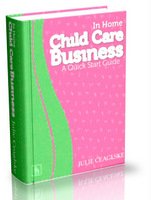Child Illness – When Should Children Stay Home???
You will more than likely be dealing with child illness in your home, especially during the long, stuck- inside winter months (like we have here in Iowa).
Many providers have asked me how I determine when a child should not come to my daycare or how I determine when they should go home. I have always sought help from where I am licensed. Below is a letter that I received from Child Care Resource and Referral of Black Hawk County in Iowa. With their permission I have included a copy for you to use below.
I give parents/guardians a copy when I accept their child or children into my daycare. Then in the fall I give them another copy- reminding them that I am following strict guidelines to keep all of the children in my care as healthy as I can. (Sometimes parents will “forget” your policy and bring their sick child, hoping you’ll make an exception… you DO NOT want to EVER make an exception when it comes to child illness!!!)
Here is the letter that I use:
Dear Parent,
I (or use the name of your daycare) am working with public health officials to decrease the spread of flu at my daycare home. We are taking measures to help our children stay healthy- but need your assistance as well. Following these recommendations will help to prevent child illness at day care and at home.
• Know the signs and symptoms of the flu. Symptoms of the flu include fever (100 degrees orally Fahrenheit or greater), cough, sore throat, runny or stuffy nose, body aches, headache, and feeling very tired. Some people may also vomit or have diarrhea.
• Do not bring your child here if they are sick. Any child who determined to be sick while at child care will be sent home. You should begin to plan for how you can care for sick children at home. If you child becomes sick during care, you will be notified and expected to pick them up within a half hour.
• Keep your sick child at home for at least 24 hours after the fever is gone, without using fever-reducing drugs.
• Teach your child illness (flu) is spread from person-to-person. If age appropriate, teach them to cough or sneeze into a tissue and then throw the tissue in trash. When a tissue is not available, cover their cough or sneeze using their elbow or sleeve instead of their hands as that can spread germs.
• Teach your child to wash their hands often with soap and water, especially after they cough or sneeze. If soap and water is not available, an alcohol-based hand gel can be used. You can set a good example by doing this yourself.
• Teach your child not to share personal items like beverages, cups, food, unwashed utensils, or toothbrushes.
• Get your family vaccinated for seasonal influenza and novel influenza A (H1N1)
We appreciate your help in keeping our children healthy.
Sincerely,Your nameYour business name
By giving your parents a copy of this letter, you can eliminate awkward moments and questions, and it states things perfectly clear. You need to be firm about your child illness policy- unless you want to provide sick care. If you do, you could possibly be putting yourself, your family, and the other children you care for at risk. And in the child care business health and safety for all children is our number one concern
Go to the top of Child Illness
Return from Child Illness to Child Care Business HOME - child care jobs







